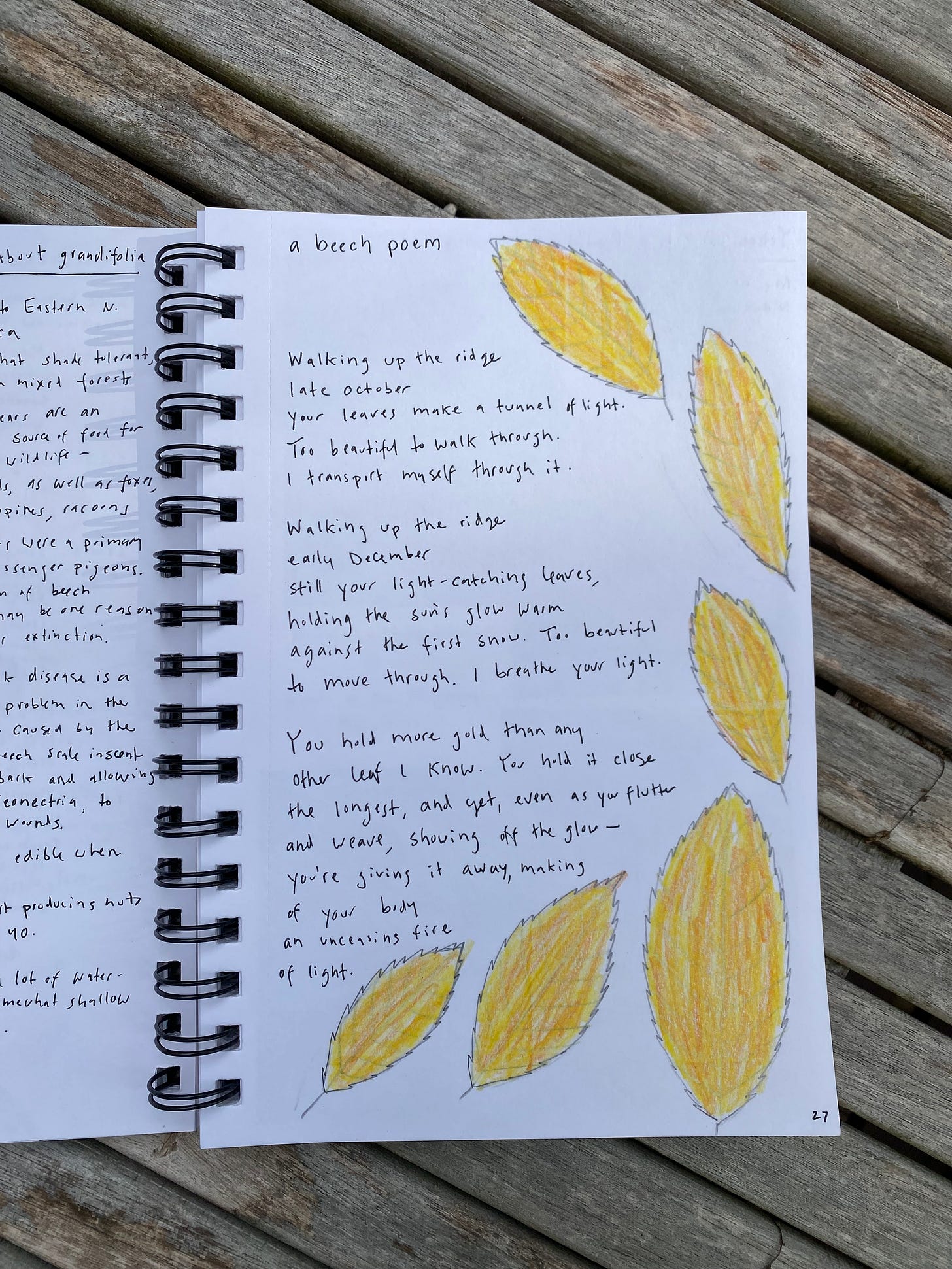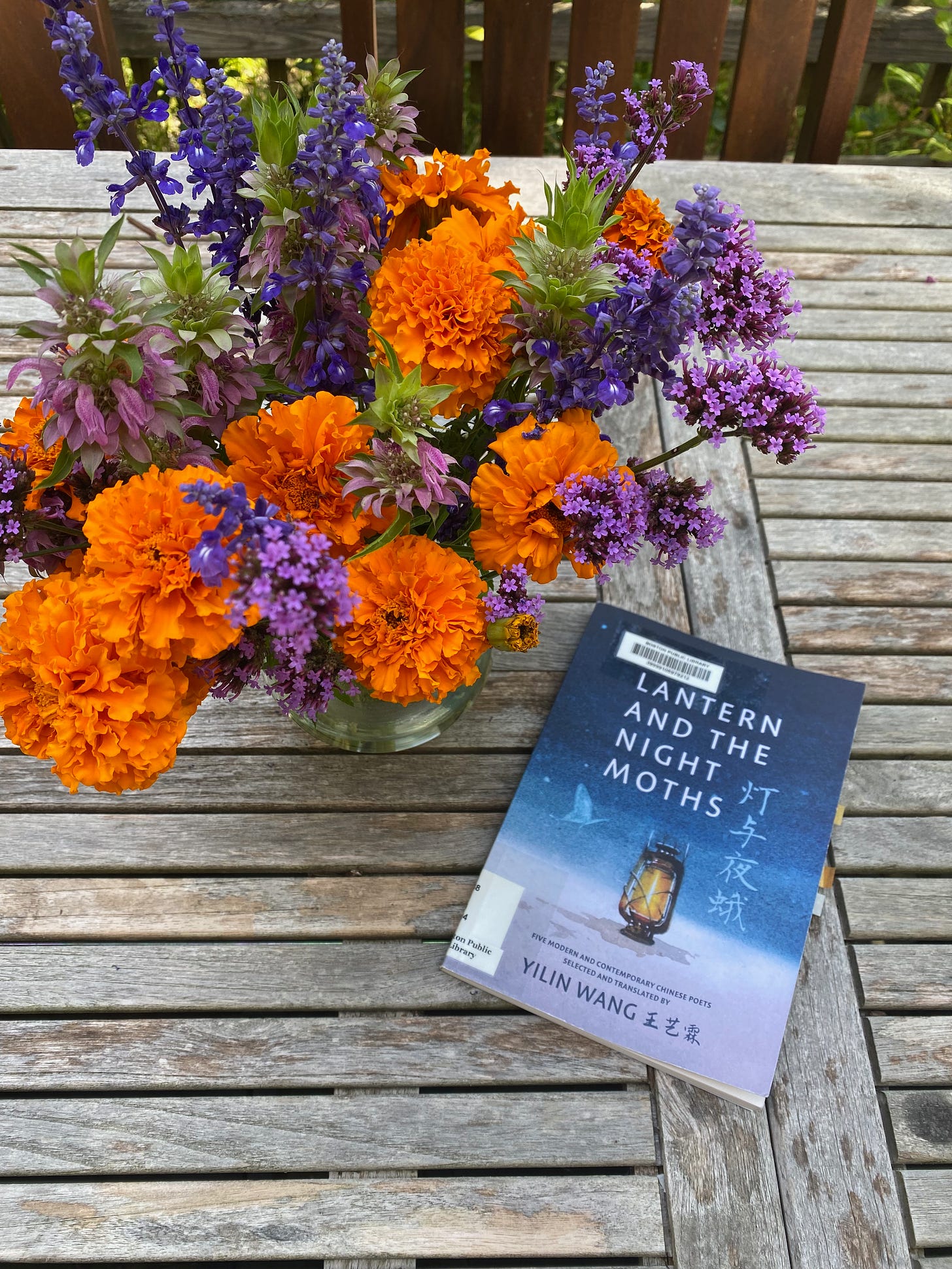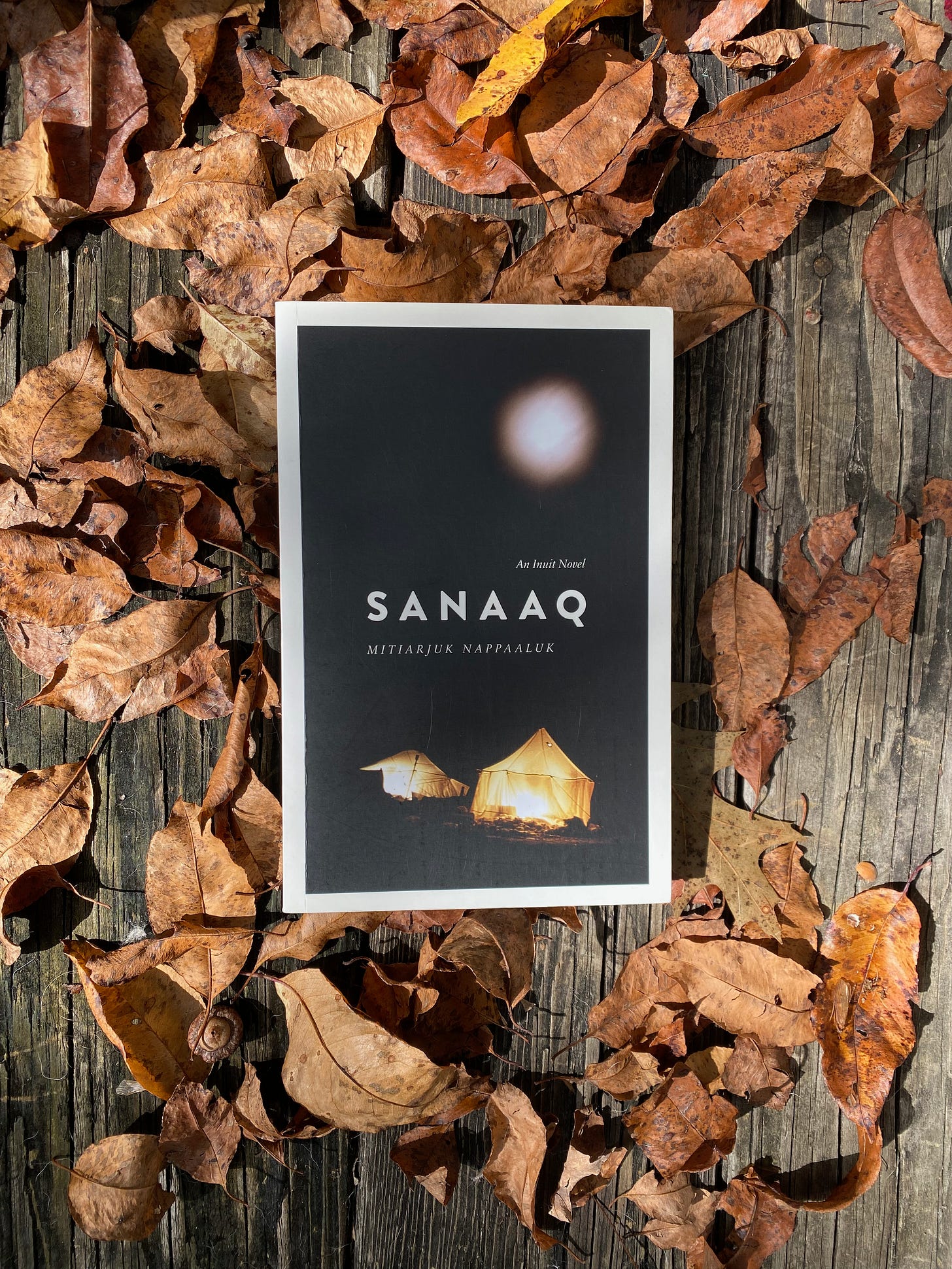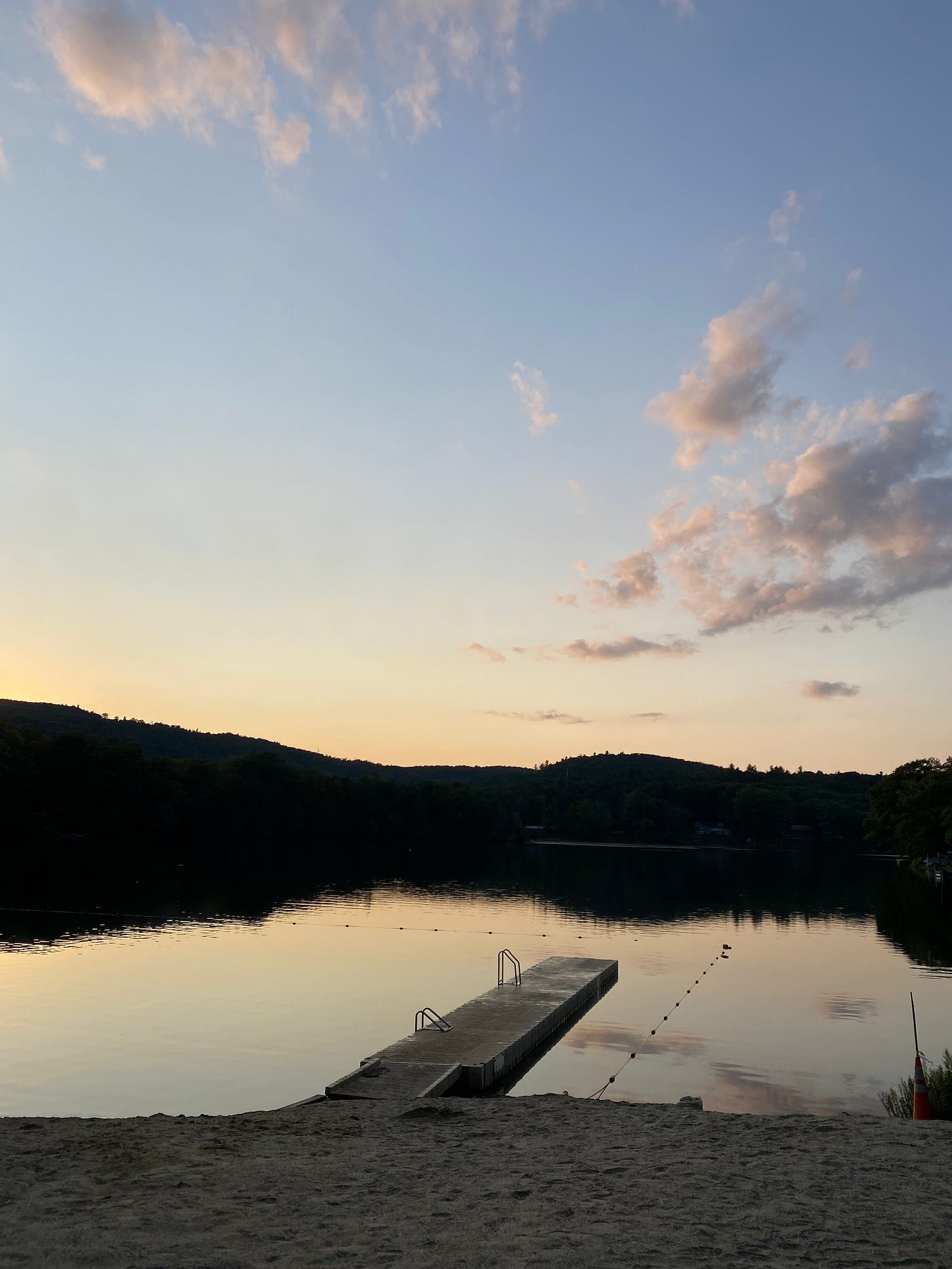Greetings, bookish friends. It’s been a while. I am feeling so many things in my body, my brain, my heart. There is so much catastrophe everywhere. It’s been a year of genocide in Palestine. I’ve been stumbling over sentences, reading about the floods in the Southeast. I stopped demanding perfect words and perfect actions of myself a long time ago, because those things don’t exist. I’ve found @countryqueers helpful for providing information and resources about ways to help Appalachian communities. I will be at this protest this weekend, because at the very least, protest is energizing and rejuvenating, a way to recommitment to ongoing struggle. And here is a little gift I will be giving myself this week. Maybe you could use it, too.
Weirdly and impossibly, but truly—I can’t lie about it—alongside all of my despair and grief and anger, I’m feeling something new this fall: joy. New joy. I made a big decision and took a big risk and now, for the first time in 18 years, I’m back in school. Massachusetts has an incredible new program that makes community college COMPLETELY FREE for anyone without a college degree.
I did a year of college before dropping out to become a farmer. I spent my 20s running a successful vegetable farm. When I decided to stop farming, I wasn’t sure exactly what was next. I moved to the Valley to put down roots—and I’ve started doing that—but I’ve also been miserable. I’ve cobbled together a work life that doesn’t give me anything I want or need. For four years I’ve been treading water, just getting by, not going anywhere. For years, every time I thought about finishing my degree, I thought, “nah, that’s too hard.” Every time I thought about getting an MFA, I thought, “no, you’ll have to do something you don’t even like (teach) and it’s too hard.”
And then, this summer, I snapped. I realized that the kinds of changes I want to make in my life are going to require work. The small changes I’ve been making aren’t enough. It suddenly became so clear to me that I had been telling myself I wouldn’t like something or couldn’t do something before I’d given myself a chance to try it. So I’m going to finish my BA. I still don’t know exactly what I want my future to look like. I don’t have any illusions about the academy. Getting an MFA (the most likely eventual goal) isn’t going to make me a writer. I’m a writer already. But reaching out into the world—starting something new—is going to get me where I want to go. I know this in my bones.
I know this in my bones because I love school. This semester I’m taking two classes: botany (!!!) and visual concepts, an introductory studio art class. I’m learning about the different kinds of tissues plants make. I made my own brushes and ink with plant material for art. I’m starting to be able to identify different kinds of ferns. I feel dizzy with the luck of it, that I get to do this. I am so curious, so eager, so delighted to be using my brain in this new way. I told my therapist the other day that I was not in a place to receive the gift of school at 19, and now I am. She made me say it again: “I am ready to receive the gift.”
I am ready to receive the gift.
I meant to get this newsletter out last week but I had too much going on. I haven’t been this busy in a long time, and I’m still figuring out how to balance work and school and poetry and feeding myself and swimming and making time to be around people and and and. So, since September’s over, I thought I’d share mini reviews of every book I read (presented in the order I read them), interspersed with some photos of…can I call it college life? I’m calling it college life.
It’s a long one, but I won’t be back in your inboxes for another month, so maybe read it leisurely, a little bit at a time.
The Charioteer by Mary Renault (1955)
I had so many mixed up and contradictory feelings about this Very English Messy Gay Drama from the 1940s. It has a happy ending (two men fall in love and remain together at the end of the book), although it is not a happy book. It is not capital R romance, but it is capital M mess. It’s set at a military hospital in 1940; Laurie is a wounded soldier recovering after Dunkirk. He falls for Andrew, a conscientious objector working at the hospital, and then he runs into Ralph, whom he knows from school, and who he idolized when he was younger. Ralph now runs with a queer crowd, and Laurie has basically never been in a room with another openly gay man in his life. It’s a lot. Who will he choose?!? I’m being cheeky on purpose because while this book is layered and complicated, it’s also a gossipy melodrama full of characters mucking about with each other and mostly messing up. I loved reading it and talking about it!
Cultish by Rajiv Mohabir (2021)
This is a collection about language. There is a lot of Hindu, Hindustani, and Sanskrit. Sometimes whole poems are in another language; sometimes he translates them. Many of the poems are written in the same form: a Hindu couplet in italics, a series of couplets in English, and a final offset couplet, also in italics, that translates the first couplet. I didn’t always love the individual poems but I love this form. All of Mohabir’s work wrestles with questions of where language lives, where it comes from, what can be said in one language and not in another, the physical routes language takes across the world, and what it means to be a poet working in multiple languages, always translating.

When Language Broke Open edited by Alan Pelaez Lopez (2024)
I was so excited about this anthology of poetry, essays, stories, and multimedia pieces by queer and trans Black writers of Latin American descent, but it was a big disappointment. Almost every piece felt rushed or unfinished or so vague I couldn’t figure out what it was really about. This was especially true with the poetry. Almost all of the poetry in this anthology is the kind of statement-based, no-imagery, can’t-find-the-form poetry that I almost never like. None of it moved me or excited me or did anything for my language joy organ. I did like some of the essays—there was a fantastic piece on abolition and a few moving reflections on first queer experiences in the specific context of being Afro-Latinx.
This book is about celebrating Blackness within Latin American diasporas and the complex intersections of identity many of these writers hold; about anti-Blackness, immigration, and belonging; about finding homes for queerness and transness in different cultures. But despite these themes, the book all ran together and none of it will stay with me.
The Lantern and the Night Moths by Yilin Wang (2024)
I absolutely loved this book. I would like to read 100 more books like this, poetry interspersed with essays about poetry and translation. I really enjoyed all five of the Chinese poets Wang translates and presents in this book, especially Qiu Jin, Fei Ming, and Xiao Xi. But the best part is Wang’s essays about their translation process and their relationship to the poets. The essay about Qiu Jin, a 19th century feminist poet who cross-dressed and wrote about queer platonic love, is written as a letter, in which Wang reflects on their own identity, and their relationship to Jin’s words and legacy. In other essays, she carefully reflects on the challenges and joys of translation, taking us through the choices she made for each poem, illuminating both what is not translatable, and what is. She provides context about the times and places these poets were and are working in, offering (small but mighty) insights into Chinese literary and poetic history.
From Unincorporated Territory [Hacha] by Craig Santos Perez (2028)
The book is the first in Perez’s From Unincorporated Territory series: a complex, poetic map and history of Guam—its colonization, the violences it has experienced at the hands of Spanish Catholic missionaries and American Empire, its landscapes, and, of course, the Chamoru people and language. It’s full of what I’ve come to expect from Perez. It’s dense and challenging. He plays with space on the page in fascinating, unexpected ways. Some of these poems are maps—of US military bases on Guam, of air traffic routes from Guam to elsewhere, of routes Spanish galleons took. Almost all of the poems sprawl in sometimes-confusing shapes across the page. English and Chamoru words are interspersed. Some of the Chamoru is translated and some isn’t. All of this makes his work a journey to read.
Self-Reliance by Ralph Waldo Emerson (1841)
I reread this short treatise for the first time in 20ish years and OH WOW, what a lot of philosophical rot! I reveled in knocking down Emerson’s absurd arguments and reflecting on why this essay had such an impact on me at seventeen. I wrote about it here.
Simple Passion by Annie Ernaux, tr. Tanya Leslie (2003)
Wow! This might be the most boring book I’ve ever read! She has an affair with a man. It consumes her for two years. She decides to write about it. The end. Put another way: She is obsessed with this dude. Then she is obsessed with writing about him. Eventually she will forget about him. The end. Wild how little I care about it!

Rules for Ghosting by Shelly Jay Shore (2024)
Do you need a love story/ghost story/family drama about a trans man who can see ghosts in your life? Yes, you do. This warm, loving, messy novel is set in a family-owned Jewish funeral home in Providence and it is full of tangled relationships and the breaking of ingrained patterns from childhood and tender romance and queer family. It is so funny and so full of heart. It filled me up.
Thunder Song by Sasha LaPointe (2024)
I didn’t like LaPointe’s memoir or her poetry collection, but I loved this book so, so much. The essays are focused and sharp with emotional and intellectual clarity. They are full of anger and grief and so much love—for Coast Salish people and land, for her family and community, for her partner. I especially love how she writes multiplicity. Several essays are about the punk scene, and the home she found there as a teenager who’d experienced sexual violence and didn’t know how to talk about it. She writes about how punk gave her power and language. She also writes about the intense, ongoing racism she encountered in the punk scene, how it failed and alienated her as a Native woman. The whole book is layered with contradictory truths.
Invasive species by Marwa Helal (2019)
I don’t know how to talk about this book because the things Helal does with form, with language, with the poetics of anger and space, with structure—it’s just incredible. The second section “Immigration as a Second Language” is a long poem (or series of poems), an abcedarian of sorts, about Helal’s hellish, multi-year journey trying to get back into the U.S. from Egypt. Except that is putting it far too simply, because the poem(s) is about so much more than that: racist U.S. immigration policy, yes, but also home and belonging and movement of all kinds, and the violences and fallacies of borders, and being young and alone and scared, and language (of all kinds), about exile and return and not having the right words, about classification and “invasive species” and what is “native” and what’s not. It is made of dairy-like prose poems, dream sequences, emails, newspaper articles, a map/pop quiz, lists, definitions, tons of footnotes, and several epilogues. It is dense, raging, vulnerable, hard to capture.
The Vanished Birds by Simon Jimenez (2021)
My brain started bouncing off sci-fi during the pandemic, but it is slowly coming back online, and I’ve been craving stories set in space. So many people told me this book was amazing when I asked for sci-fi recs. Sadly, I disliked it immensely. I did enjoy some of the sci-fi elements: the space travel, the corporate overlords with their resource worlds, all the bleak inequality. It’s all so richly drawn. But the characters are not. They don’t spend any time with each other. They don’t really have any conflict with each other. Not one relationship in this book has any emotional resonance. Every relationship is built on some kind of insta-love, and then I’m supposed to believe that those relationships defined the choices these people made? Not for me.

I’ll Have What He’s Having by Adib Khorram (2024)
I listened to this as a bedtime romance (audiobooks to help me fall asleep) and it was perfect for that because it has the kind of pacing I will never, ever love in a romance: the MCs meet, are instantly attracted to each other, have sex, and fall into dating (sort of). I like endless buildup. If the characters kiss before the 40% mark, I am not going to love the book. However, this is a quick, fun read about two thirty-something men (almost 40, loved that) with different goals and dreams working out how to make a life together. I loved the Kansas City setting. I loved Ferzhon’s best friends and family and the family-owned restaurant. And the focus on Iranian food (yum)! The conflict was somewhat boring and the final breakup/conflict was totally nonsensical. Overall: Aggressively Fine, and to be honest, I’m not sad about it.
Toward Eternity by Anton Hur (2024)
I love this book to incoherence. I don’t even know how to write about it. It’s a thorny, poignant, very queer speculative novel told through multiple POVs, beginning in the near future and ending in the very distant future, as earth and its inhabitants change. It all begins with a technology for curing cancer that replaces cells with nanites, and also with an AI unit, Pranit, who a researcher trains on poetry.
The whole book is a love letter to poetry. It’s about language and why it matters. But it’s not a book about how language has the power to save the world. It’s not about how poetry is some noble art form that reflects the best of us. It’s about how language and poetry make us, are us. How the act of language gives us shape, identity, and meaning. It’s about how our lives and bodies are made of language, even as they are made of time and cells. It’s about how language and poetry make us human, and about how, therefore, language is never neutral. Poetry can be a weapon or a song, a tool, a rift, a memory, a devastation, a balm. I can’t do it justice. I will be thinking about this book forever.
Letters to Forget by Kelly Caldwell (2024)
This is a devastating and incredibly inventive collection, published posthumously after Caldwell’s death in 2020. I wrote a review of it which will be forthcoming in BookPage, so unfortunately you’ll have to wait for that to hear more. It’s about mental illness and queer love and being trans and familial homophobia. The end-stops and lineation are dazzling.
Your Dazzling Death by Cass Donish (2024)
This is another devastating but very tender collection. Donish was Caldwell’s partner, and this book is about her death, their life together, and Donish’s grief. It’s a heavy collection, and yet something in it felt light to me, almost buoyant. There’s so much love in these pages. Caldwell feels so specifically alive in them.
We Still Here by Marc Lamont Hill (2020)
This is a very short book. The first half reads like a long article outlining all the systemic injustices covid made worse, and the utter failure of the government to do anything about any of it. The second half focuses on abolition and the Black Lives Matter movement in historical context. Everything Hill says is important, but I found it somewhat exhausting and jarring to listen to in this particular moment, as it feels like everything he mentions has only gotten worse since 2020.
Ten Bridges I’ve Burnt by Brontez Purnell (2024)
This is a short memoir in verse about being Black and gay, about aging and dating and writing for TV and being cynical but still alive. It’s about being from the South and making poetry and the people in his life who’ve hurt him and who’ve been there for him. I love how Purnell writes about sex and bodies. I love his matter of fact, here I am, here’s what I know/feel/think humor.

Galatea by Madeline Miller (2022)
Despite my love of Madeline Miller, I’d never read this short story, a retelling of the Pygmalion myth. I could have read a whole novel about Galatea, but this story is a gorgeous whole, with incredible layers and characterization, given its length. There is so much in this about motherhood, sacrifice, loss, depression, violence against women, and suicidality. Galatea’s actions are so complex. I was just stunned by all the ways this book made me think, all the things it made me think about. It is very sad—harrowing, really—but somehow, instead of feeling tragic, it feels powerful.

The Route of Ice and Salt by Gabriel De Leon, tr. David Bowles
I listened to this during a short audiobook sprint and I have no idea what happened. It’s a…retelling?…of Dracula. I think? I realized that I actually don’t know anything about Dracula other than he’s a vampire. This book is told from the POV of the captain of the ship that brings Dracula to England. He spends the voyage detailing his erotic fantasies about the men on board. It’s very weird and creepy and so bodily. I might have liked it if I had been in a different mood or read it in print.
Scattered Snows, to the North by Carl Phillips (2024)
I love Carl Phillips and I loved his latest collection about time and memory and aging and looking back on past versions of self, past versions of life. It’s full of slow, dense, beautiful meditations on what changes and what doesn’t, full of birds and woods and the ocean. I am, as always, in awe of Phillips’s syntax. Also: I got to hear him read and he was so good and he signed my book and I lost it a little because, Carl Phillips!
Sanaaq by Mitiarjuk Nappaaluk, tr. Peter Frost & Bernard Saladin d'Anglure (1984, English translation 2014)
This is a fascinating book. I didn’t enjoy it, exactly, but I loved the time I spent with it. It made me think a lot about what a “novel” is (a category I am becoming less and less interested in). It was originally written in Inuktitut syllabics at the request of Catholic missionaries living in Nunavik. They wanted to better understand the Inuktitut language, so they asked Nappaaluk to write a phrasebook. Instead, she wrote a series of short stories about a group characters and their daily lives. This is a dense, complicated read that left me with a lot of unresolved feelings about history, ethics, art-making, translation. I highly recommend it, and wrote about it in depth here.
You Had Me at Happy Hour by Timothy Janovsky (2024)
Another bedtime romance read, but this one was a little too meh to fall into the Aggressively Fine but Quite Enjoyable category. The characters were boring. The pacing was boring. There’s a third-act breakup precipitated by the most absurd non-communication. Do people really just not say something because they think they know what the other person thinks? Probably. I just do not want to read about it.

Moving Forward Sideways Like a Crab by Shani Mootoo (2014)
I love Shani Mootoo and I am determined to read everything she’s written. I have big, big mixed feelings about this book. It’s a complicated, messy, wonderfully fluid trans story, told from the POV of a cis man. The main character reconnects with his parent after many years and learns he’s a trans man. But, like I said, Sydney’s story is thorny. It’s a story that often feels illegible to the cis gaze, and yet it is mostly told through the cis gaze. I loved parts of it and hated others. In a lot of ways it felt to me like a book about the limits of love, the places love cannot take us. So it’s a very sad book. I don’t know what to make of it and I might have to read it again.
Stories are Weapons by Annalee Newitz (2024)
This is extremely good and also chilling. Newitz delves into the history of psychological warfare—not just disinformation and misinformation and propaganda, although all of those are part of it, but the very specific ways in which the U.S. military has used psychological warfare against other countries, and how the U.S. government, as well as corporations, use it against U.S. citizens. The term “psychological warfare” came into common use during the Cold War, but Newitz traces it much further back, to how the government used it to foster anti-Indigenous racism during the Indian Wars. They don’t make simple generalizations like “art will save us” or “all propaganda is bad.” Instead, they argue that stories are powerful, dangerous, complicated tools that shape how we understand the world. To avoid psychological warfare, we have to understand how they work.

Dressed in Dreams by Tanisha C. Ford (2019)
I really enjoyed this blend of memoir, history, and fashion. Ford uses various articles of clothing and hairstyles—dashikis, hoodies, leather jackets, baggy jeans, knee-high boots, bamboo earrings—to reflect on her own life and her relationship to clothes, style, and culture. She delves into the history of various iconic fashions and looks at how Black and hip hop culture have shaped so much of American fashion. A lot of the book is about growing up in Fort Wayne, Indiana, what it means to be a Black woman from this specific place, and how fashion helped her figure out who she is and who she wants to be.
Under the Feet of Jesus by Helena Maria Viramontes (1996)
I struggled with this novel—it’s very dense. Listening it reminded me of listening to Toni Morrison. If I lose focus for even a second, I’m lost. It was definitely a wrong time/wrong format situation. Despite that, I appreciated the depth of Viramontes’s world-building and characterization. The novel follows a family of Mexican migrant farm workers as they move among various migrant labor camps in California. Viramontes writes brilliantly about a specific agricultural rural landscape, capturing the extreme brutality of the conditions these characters live and work in. But she writes writes moments of extreme tenderness and love with the same depth and detail. This is one I plan to revisit when I’m in a different frame of mind.
The Gaza Kitchen by Laila El-Haddad & Maggie Schmitt (2012)
It took me a long time to read this cookbook, my first cookbook cover to cover. I loved learning more about Gazan cuisine, which is unique from the cuisine in other parts of Palestine, partially because of its history as a port and meeting point of many different cultures. Gazan food is defined by two ingredients: hot peppers and dill (both the herb and the seeds).
The recipes in the book are mostly collected from ordinary Gazans. There are dozens of interviews scattered throughout with farmers, chefs, people who run communal kitchens, bakers, and home cooks. They all speak with so much pride and joy about their history and culture. They also tell harrowing stories about being displaced in 1948 and fleeing to Gaza, about thriving family farms and orchard bulldozed by Israel, about the near-impossibility of getting food because of the blockade. It’s a gutting read and a celebration of the vibrant food culture that persists in Gaza despite occupation and genocide.
Poem Bitten by a Man by Brian Teare (2023)
This is an incredible collage poem made up of fragments from Teare’s notebooks, journals, published work, and the work of many of the artists he writes about, mostly Jasper Johns and Agnes Martin, but also others. It’s about the dissolution of his relationship, illness, creativity, art-making, capitalism, and queerness. There is so much in here about visual art and poetry and spatial relationships and the material world and language, about what it means to make art and be in relationship, with others and with art. It’s a book about mark-making, about the marks we leave and the marks other people leave on us.
Desire/ Halves by Jai Hamid Bashir (2024)
What a lush chapbook. It is full of mouths and animals and journeys: across space, through language, and mostly in and out of bodies and what it’s like living inside one. The poems are dense with color, fruit, places, desire. Many of them are infused with a sense of movement and endlessness: the speaker searching for meaning and respite, a place to rest, a way to untangle the threads of living between and among geographies, between and among languages. Roadkill appears several times, as do various religious texts. All of these references give the poems a wonderful heft and density. They feel deeply rooted in the now but they also feel cosmic—a longing and a yearning flung outward from the self, toward the stars.
As always, a little. bit of beauty to send you on your way: My fall evening swims have been spectacular.
Wishing you all some little October sweetnesses in this broken world.







![From Unincorporated Territory [Hacha] in a patch of light on a blue and white rug. From Unincorporated Territory [Hacha] in a patch of light on a blue and white rug.](https://substackcdn.com/image/fetch/$s_!TOY3!,w_1456,c_limit,f_auto,q_auto:good,fl_progressive:steep/https%3A%2F%2Fsubstack-post-media.s3.amazonaws.com%2Fpublic%2Fimages%2Fe4900c12-eeef-45ca-b9e5-1ca0af8acb7e_3024x4032.png)

















I can't tell you how deeply I resonate with deciding something is not for me without being brave enough to try it. A proactive defense mechanism against the unknown? Cynicism? Changes in my life over the past few years have also pushed me to branch out into the unknown, and I'm proud of this growth (even when it's tiring). I'm going to borrow your mantra here: I am ready to accept the gift. 💛 I am so excited for all the beauty you're welcoming into your life with this change... and should a day ever come when teaching is a possibility I would be happy to talk shop :)
Missed this when it came out but glad I found it again! Congrats on college life, which is absolutely what you should call it because that’s what it is—your joy in it is wonderful to read about! I have also been having some physical and cognitive dissonance over feeling joy in a writing project for the first time in years while of this (gestures at the world) happens. I appreciate you writing about feeling all of that at once. I got to see Hanif Abdurraqib speak last night, sort of by lovely happenstance, and his way of finding joy in diving deep and sharing about things and people and places he loves while also holding onto how devastating the world can be was kind of a marvel to experience.